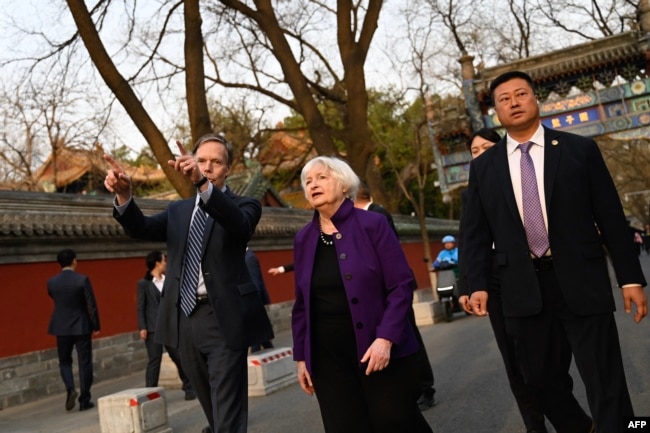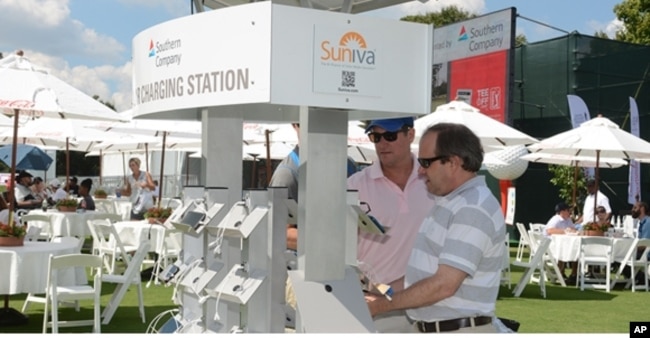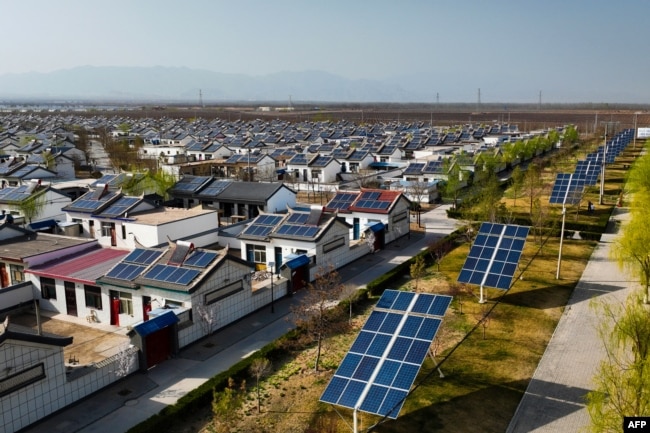AUDIO
Where Will China Sell Its Electric Cars, Solar Panels?

China can produce and sell a lot of very low-cost electric vehicles and solar panels.
This worries the U.S. Treasury Department, President Joe Biden and opposition candidate and former President Donald Trump.
U.S. Treasury Secretary Janet Yellen recently brought attention to the abundance of products such as car batteries and solar panels from China. She said they are exported at “artificially depressed” prices because of low labor costs and government support.

US Treasury Secretary Janet Yellen (C) and US Ambassador to China Nicholas Burns (L) visit Guozijian Hutong alley in Beijing on April 8, 2024. (Photo by Pedro PARDO / AFP)
Trump spoke at a political gathering late in March in Ohio. He said the U.S. needs to do something about the possibility of China’s electric cars entering North America through Mexico. He said it could be a “bloodbath,” or a huge defeat, for the U.S. auto industry if that happens.
The International Energy Agency in Paris said China accounts for 60 percent of electric vehicle sales around the world. China also produces 10 million more electric cars each year than it can sell within its own borders. That means China needs to find a way to sell the cars overseas.
Eswar Prasad is an economist at Cornell University in the state of New York. He said China will aim to export products such as cars, steel, batteries, and solar panels if its economy does not improve.
American officials have been concerned about China’s extra capacity for a long time. Speaking recently on a trip to China, Yellen talked about Suniva, a solar panel company in Georgia. It was forced to shut down at one point because it could not compete with low-cost products from China.
“It is important that this doesn’t happen again,” she said.

FILE - Suniva is an American solar business in the state of Georgia that has had difficulty competing with China. (Photo: Business Wire)
Suniva closed in 2017. It re-opened after getting financial support from the Inflation Reduction Act passed by Congress in 2022.
Steel and aluminum imports from China sharply increased after the 2008-2009 global financial crisis. In 2017, Donald Trump’s administration put tariffs in place that turned American buyers away from those Chinese imports. Biden has kept the tariffs in place.
Brad Setser is with the Council on Foreign Relations and a former Treasury Department official. He said that China’s overcapacity in solar cells, batteries and now electric cars is “insane.”
China notes that the U.S. also offers incentives to both businesses and people who want to purchase electric cars or solar panels. China said some of the financial aid being offered to U.S. car buyers is a violation of World Trade Organization rules.

FILE - An aerial view shows residential buildings with roof-mounted photovoltaic solar panels in Yinchuan, in northwestern China's Ningxia region on March 31, 2024. (Photo by AFP)
However, an international trade research group studied the issue. The Center for Strategic and International Studies in Washington, D.C. found that the financial aid China was offering its “green” industry in 2019 was more than double the amount of support coming from the U.S. government to its industries in all forms.
Both Prasad and Setser noted that while China is supporting industry, it offers few incentives to citizens to purchase Chinese goods. That leads to overcapacity.
What happens next?
The two sides have agreed to discuss the problem. China says its less costly “green” products will help the world so the U.S. should not oppose them. But China also notes that its overcapacity and lack of consumer spending is a problem if it wants to keep its economy growing.
One China expert said another concern should be policies that place too much importance on one or two industries. Huang Hanquan is an expert on industrial policy. He said China should coordinate the development of new technologies so that every province does not aim to develop the same industries.
Speaking in China, Yellen said there should be protections, so the U.S. market is not flooded with low-cost Chinese products. “I think the Chinese realize how concerned we are about the implications of their industrial strategy,” she said, adding, “I think they have heard that this is an important issue to us.”
_________________________________________________
Words in This Story
abundance –n. a state of having a lot of something, usually of something that is desired
battery –n. a device that chemically stores electrical charge that can power electronics and motors
artificially –adv. created through methods that are not natural to a process, not considered normal or fair
bloodbath –n. (figurative language) a conflict in which one side is defeated badly
capacity –n. (economics) the ability to produce a product
insane –adj. (informal) extreme, excessive
incentive –n. a policy by a government meant to guide behavior
implication –n. an effect, often a problematic one, that results from a policy or an action
strategy –n. a plan to reach a long-term goal involving many steps
We want to hear from you. Is your country worried about Chinese exports? What is the trade policy?
https://learningenglish.voanews.com/a/where-will-china-sell-its-electric-cars-solar-panels-/7561924.html